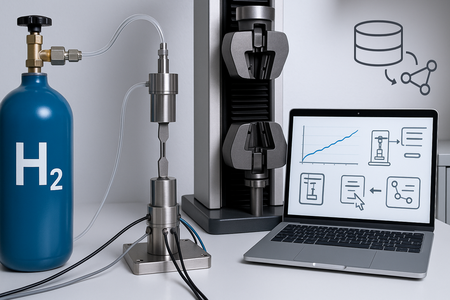
Hydrogen plays a key role in future energy and mobility systems, but its interaction with structural materials remains a major challenge. Reliable data and standardized testing procedures are essential for safe and sustainable use of hydrogen technologies. By developing reusable workflows, semantic data descriptions, and a shared infrastructure for round-robin tests, this project creates lasting value for the MatWerk community. Strong industrial participation ensures that the solutions are directly aligned with technological needs, while integration with other NFDI initiatives fosters interoperability and long-term impact. The IUC addresses the challenge of systematically capturing, semantically describing, and FAIRly providing data on the effects of hydrogen on metallic materials. It focuses on the semantic description of devices, measurement procedures, and sample history—including hydrogen charging and transportation—as well as the development of workflows and databases for data storage, sharing, and reuse.
| Main requirements: - Semantic description of the relevant devices, measurement procedures and metadata - Semantic description of the sample history, incl. H charging and sample transportation - Database to share and store data, as well as Workflows |
| Main Task Area: TA-WLE Other related Task Areas: TA-SAI, TA-MDI |
| Possible connections within NFDI: NFDI4ING |
| Material/Data: Metallic alloys, e.g., advanced high-strength steels, Ni-based alloys, Al alloys, used for structural applications and exposed to corrosive environment containing in particular hydrogen. Data is obtained from mechanical testing and thermal desorption spectroscopy. |
| Main Success Scenario: - Semantic description of the relevant devices, measurement procedures and metadata - Semantic description of the sample history, incl. H charging and sample transportation - Database to share and store data, as well as Workflows |
| Added value for the MatWerk community: The IUC results into a reusable procedure and toolset to perform Round Robin test for materials characterization. |
NFDI-MatWerk
Funded by the Deutsche Forschungsgemeinschaft (DFG, German Research Foundation) under the National Research Data Infrastructure – NFDI 38/1 – project number 460247524.
NFDI-MatWerk
Funded by the Deutsche Forschungsgemeinschaft (DFG, German Research Foundation) under the National Research Data Infrastructure – NFDI 38/1 – project number 460247524.
Subscribe to our newsletter for regular updates about materials science topics!
After subscribing, you will receive an email from us with a confirmation
link.
Only after clicking this link your registration is completed.